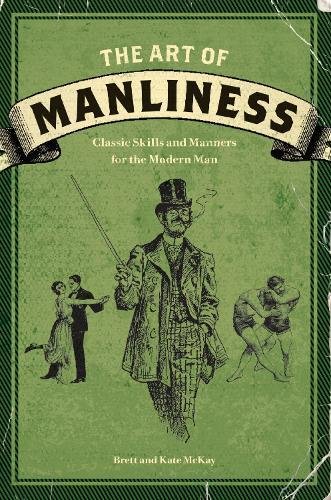After doing the podcast on the “Making of Modern Immaturity” a few months ago, and reading the comments left on that post, I got to thinking about this question: “What makes a man mature anyway?”
Masculine maturity used to be easy to spot and define: a man got married, sired some progeny, and got a job to support his family. He knew he was a grown man and everybody else did too.
These days those kinds of markers are being put off more and more. There are a variety of reasons for this, some cultural, some economic. There’s nothing inherently wrong with this trend. While I’m a proponent of working hard at your job and getting hitched to the right woman once you know she’s the one, these things simply don’t happen at the same time for every man.
And while I personally believe that getting married and having kids is one of the most effective ways to grow and mature as a man, I’m not comfortable saying that men who don’t do these things aren’t mature men. Otherwise, you’re stuck with the position that men who are Catholic priests or Buddhist monks aren’t mature men. If you believe that, you need to go say ten Hail Mary’s and then rejoin this discussion.
The problem is, in the absence of these old markers of maturity, guys don’t know how to transition from boys to men. They may not find the marriage/kids/corporate job gig appealing, but they also aren’t keen on remaining a perpetual adolescent. They feel stuck between these two guideposts – no longer boys but not yet “settled down” – and don’t see any models on how to proceed. The gap has become a life stage wasteland for men, where guys are drifting along like amoebas.
So I’d like to suggest a definition of maturity for our modern age. And it’s embodied in this phrase:
 Atlas Shrugged
Best Price: $1.94
Buy New $7.50
(as of 10:55 UTC - Details)
Atlas Shrugged
Best Price: $1.94
Buy New $7.50
(as of 10:55 UTC - Details)
Create More, Consume Less.
Boys are consumers. When they’re young, their parents set up their experiences for them; their only job is to sit back and enjoy it. They live in their parents’ house, eat their parents’ food, and use their parents’ stuff. Their free time in used in amusement. They consume their parents’ resources and are passive and taken care of. They make little to no impact on the world and have little ownership of their lives. They are dependent.
The problem is that men aren’t outgrowing this passive role. Instead of creating, they go on consuming. They may not depend on Mom and Dad anymore (although sadly, they often do), but they’re still dependent on stuff for their happiness. Consuming clothes, movies, video games, cars, parties, fast food, and even travel to make them happy. They live only for their own pleasures and amusements.
But it is boys that live only for themselves; men fully enjoy life’s pleasure but also live for a higher purpose. Boys try to find themselves in what they buy; men find themselves in what they do. Boys base their identity on what they consume; men base their identity on what they create.
The failure of men to transition from being shoppers and consumers to producers and creators has four profound implications for the vibrancy of manliness.
 The Art of Manliness: ...
Best Price: $1.99
Buy New $7.70
(as of 12:35 UTC - Details)
The Art of Manliness: ...
Best Price: $1.99
Buy New $7.70
(as of 12:35 UTC - Details)
The Weakening of Man’s Free Agency
As we’ve mentioned many times, men desire to be the captains of their destiny, to feel in control of their life. We want to be free agents and be able to turn our ship in any direction at any moment.
Consumerism feeds directly into this desire, but offers a simulated and easier version of it. Consumption, being able to choose between many options, a myriad of different products and services, is sold as the ticket to true freedom and sovereignty.
In truth, this kind of “freedom” is only an illusion. Mathew B. Crawford, in Shop Class as Soulcraft, explains:
“The activity of giving form to things seems to be increasingly the business of a collectivized mind, and from the standpoint of any particular individual, it feels like this forming has already taken place, somewhere else. In picking out your [Build-a-Bear’s] features, or the options for your Warrior or Scion, you choose among predetermined alternatives. Each of these alternatives offers itself as good. A judgment of its goodness has already been made by some dimly grasped others, otherwise it wouldn’t be offered as an option in the catalogue. The consumer is disburdened not only of fabrication, but of a basic evaluative activity…The consumer is left with mere decision. Since this decision takes place in a playground-safe field of options, the only concern it elicits is personal preference. The watchword here is easiness as opposed to heedfulness. But because the field of options generated by market forces maps a collective consciousness, the consumer’s vaunted freedom within it might be understood as a tyranny of the majority that he has internalized. The market ideal of Choice by an autonomous Self seems to act as a kind of narcotic that makes the displacing of embodied agency go smoothly, or precludes the development of such agency by providing easier satisfactions. The growing dependence of individuals in fact is accompanied by ever more shrill invocations of freedom in theory, that is, in the ideology of consumerism. Paradoxically, we are narcissistic but not proud enough.”
Consumerism offers so many choices that we fail to see that they all reside within a predetermined box. The great paradox in the struggle for modern manhood is that we simultaneously feel adrift because of anomie and cripplingly trapped because of consumerism.
May 11, 2010





